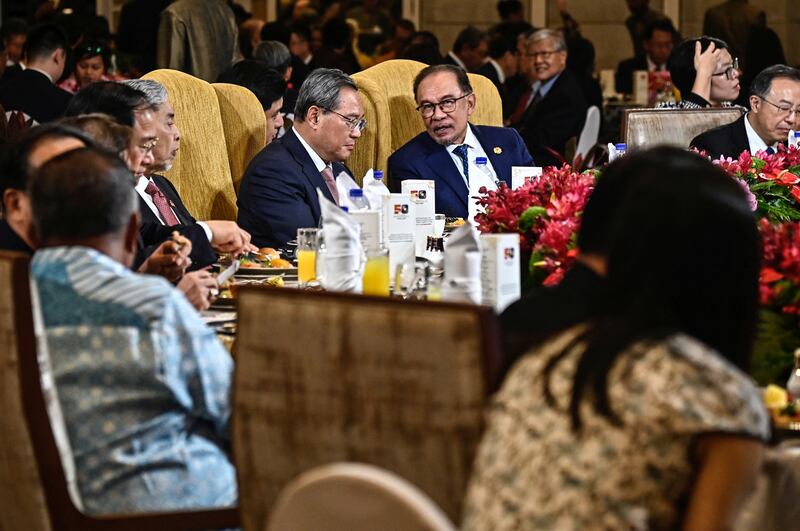Kuala Lumpur and Beijing marked 50 years of diplomatic relations by deepening their ties through a slew of economic and trade pacts, as Chinese Premier Li Qiang wrapped up a three-day visit to Malaysia on Thursday.
Li’s visit was the final leg of a trip that included New Zealand and Australia, as Beijing seeks to shore up its influence in the region amid rising geopolitical rivalry with the United States.
China’s No. 2 official and Malaysian Prime Minister Anwar Ibrahim put on a show of bonhomie and ignored almost any mention of bilateral disagreements.
During a luncheon with the Malaysia-China business community on Thursday, Anwar said he had found China’s leadership to be friendly, respectful and understanding of cultural differences.
“[T]his is not what is being portrayed elsewhere. … Malaysia is your true friend. And to Malaysians, China is our true friend,” Anwar said, according to a transcript from the government.
A joint statement released after Li departed said the two leaders had agreed that their countries’ territorial dispute in the South China Sea should be settled by peaceful means “through friendly consultations and negotiations.”
The two countries will launch a bilateral dialog on the management of maritime issues as early as possible, the statement said.
On Wednesday, Li held private talks with Anwar in Putrajaya, the Malaysian administrative capital. Afterward the two leaders witnessed the signing of 14 memorandums of understandings, including on technology, cross-border crime, green energy and the renewal of a five-year trade and investment plan.
China also agreed to the import of fresh Malaysian durian – a spiky and smelly fruit that is considered a delicacy in many parts of Asia. Malaysia said it would extend a visa exemption for China tourists until 2026.

Collins Chong Yew Keat, a foreign affairs expert at the University of Malaya, said the agreements showed economic ties were being ramped up, “but in targeted sectors that will also benefit China in a greater geopolitical sense.”
“Certainly it will signal a new drive by China to pull Malaysia closer to its orbit, and to send a signal to the region and the West that Beijing’s strong and conventional sphere of influence and economic ties in the region are based on time-based advantage,” he told BenarNews.
“Using geographical advantage, historical links and the string of economic measures and assurances of shared prosperity, China is fending off increased Western overtures.”
Mutual development
At a state dinner on Wednesday evening, Li praised Malaysia’s diplomatic independence and longstanding friendship in a “world fraught with changes and turbulence.”
He said further coordination of development strategies and interests would benefit both nations.
“It is important to develop greater synergy between the Belt and Road Initiative and Madani Economic Framework, step up trade in agricultural and other products, and tap the potential of cooperation in emerging areas such as green energy and advanced manufacturing,” Li said, according to a release by the Chinese embassy.
Anwar’s trademark Madani framework sets out key areas for Malaysian development by 2030.
The Malaysian prime minister, for his part, said that bolstering ties with China was not about short-term gains but securing long-term benefits.
“We believe that it is in Malaysia’s strategic interests to forge amity and cooperation with China, not against it,” he said in his keynote at the dinner reception.
Anwar has vowed that Malaysia will stay neutral amid intensifying rivalry between China and the U.S, while trying to position the country as a non-partisan hub for manufacturing of hi-tech goods amid shifting global supply chains.
Ahead of Li's visit, Anwar said Malaysia was angling to join the Beijing and Moscow-backed BRICS bloc to diversify its economic options.

Brian Wong, a fellow at the Centre on Contemporary China and the World at the University of Hong Kong, said Beijing viewed Malaysia as a linchpin of its Southeast Asian and Indo-Pacific economic diplomacy.
“The Malaysian leadership, especially under Dato Anwar Ibrahim and given the country’s long-standing commitment to justice in the Middle East, is increasingly alarmed by what it views to be the arbitrary impunity of the U.S. and its allies within the context of the war in Gaza,” he told BenarNews.
“China thus senses a strategic opening in building up more multidimensional ties with Malaysia, in ways that are not strictly self-serving.”
Pan-Asian Railway
As part of his visit, Li attended a groundbreaking ceremony with Anwar for an integrated transport hub that will be part of Malaysia’s East Coast Rail Link (ECRL).
The ECRL is a U.S. $16 billion rail project being built under Beijing’s globe-spanning infrastructure drive, the Belt and Road Initiative (BRI).
The 665-km (414-mile) rail project, which will span the states of Selangor, Pahang, Terengganu and Kelantan, was launched in August 2017, but it has been bogged down by delays and cost overruns.
The railway is a prime example of China’s infrastructure largesse in Southeast Asia and, on Wednesday, Li said Beijing was ready to explore ways to link ECRL with Laos and Thailand.
“This will promote greater progress in the construction of the New International Land-Sea Trade Corridor, and make greater contributions to enhancing regional connectivity and deepening the development of the ASEAN Community,” Li said, referring to a trade route between western China and Association of Southeast Asian Nations.
Chong, from the University of Malaya, said that Li’s comments reflected China’s “long held dream” of a Pan-Asian Railway connecting it by land to mainland Southeast Asia.
“This complements and completes the full circle for China in having a dual access to the vital region through a maritime route and land route,” he said, adding it would also give Beijing a fallback passage for logistics in the event of maritime conflict in the South China Sea.
